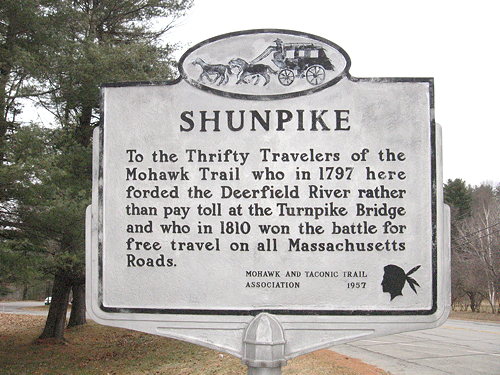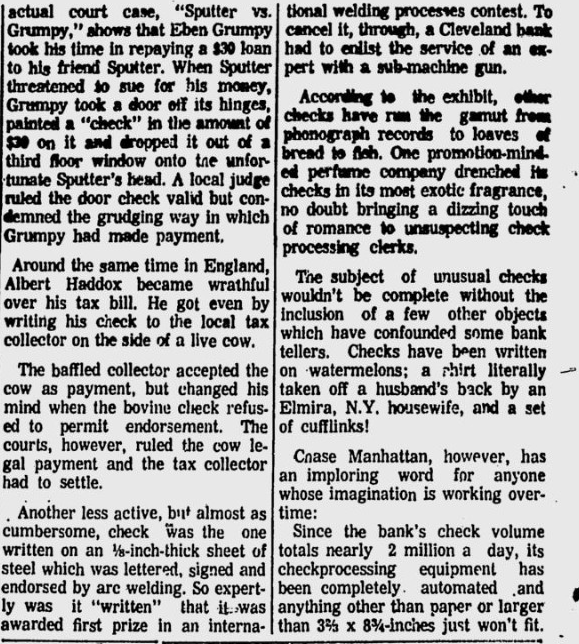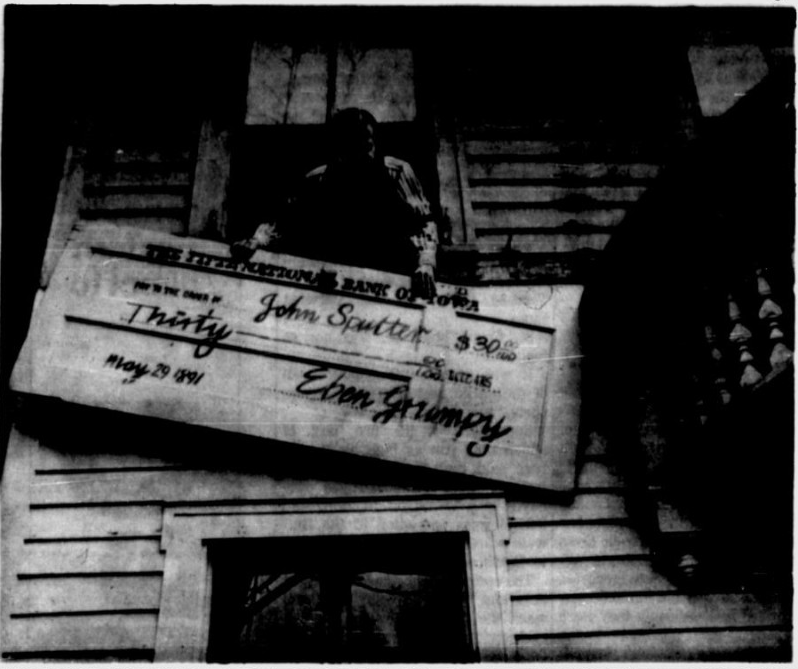Pranks and Revenge
Shunpikes
Residents of the Northeastern U.S. may be familiar with the concept of shunpikes. Though I lived in Massachusetts for five years and just learned of their existence recently.A 'shunpike' is a road deliberately built, or taken, to avoid a toll road. It's short for 'shunning a turnpike'. This differentiates a shunpike from a 'freeway' which also doesn't have tolls, but wasn't deliberately built to avoid an existing toll road.
More info: wikipedia

image source: hmdb.org
Shunpikes are like the engineering equivalent of spite houses. Their purpose is to give the finger to someone else (the owner of the toll road). As such, they often inspire bitter grievances and feuds. Details of one such feud was reported in the Poughkeepsie Journal (June 3, 1962):
The principal landowner in the Lithgow area was old David Johnston who called his vast property and home Lithgow, a name borrowed by the little settlement nearby... David Johnson was so infuriated that the new turnpike was laid out considerably west of the old road, and so, quite a distance from his home, that he built the Shunpike on his own land...
Whatever the plans for the Shunpike were at that time, they certainly irked the Dutchess Turnpike Co. It published a notice, signed Jesse Oakley and dated Dec. 16, 1809, in the Poughkeepsie Journal of Dec. 20 telling of its intention of asking the next Legislature to permit to to change the location of its toll gates "from time to time in case any road shall be opened to permit travelers to pass around it. . ."
Residents of the Towns of Washington and Clinton promptly called an "Anti-Turnpike" meeting for Dec. 29.
Posted By: Alex - Thu May 26, 2022 -
Comments (3)
Category: Highways, Roads, Streets and Traffic, Pranks and Revenge
The Eleven Commandments of Revenge
From Spite, Malice & Revenge: The Complete Guide to Getting Even, by M. Nelson Chunder and George Hayduke (1988).These commandments seem like they would be broadly applicable to many types of criminal activity.


Posted By: Alex - Sat May 21, 2022 -
Comments (1)
Category: Pranks and Revenge
Compost Fence
A dispute between neighbors in Lodi Township, Michigan has resulted in one of them (a farmer) creating a 250-foot wall of cow manure along the property divide. The non-farmers are calling it a "poop wall" and complain that it smells awful. The farmer disagrees, saying that it's merely a "compost fence". Plus, it turns out that it's perfectly legal since it's on his property.More info: mlive, fox detroit

Posted By: Alex - Mon May 03, 2021 -
Comments (3)
Category: Pranks and Revenge
Strange Personal Checks




Source.
Posted By: Paul - Fri Dec 04, 2020 -
Comments (7)
Category: Animals, Eccentrics, Food, Money, Pranks and Revenge, 1960s
Hamlet, the Rock Musical
Posted By: Paul - Tue Mar 03, 2020 -
Comments (0)
Category: Beauty, Ugliness and Other Aesthetic Issues, Costumes and Masks, Death, Ineptness, Crudity, Talentlessness, Kitsch, and Bad Art, Pranks and Revenge, Theater and Stage, Homages, Pastiches, Tributes and Borrowings, Pop Art, Foreign Customs, Seventeenth Century, Sixteenth Century, Brain Damage, Cacophony, Dissonance, White Noise and Other Sonic Assaults
The Shabby Millionaire
1989: John Barrier of Spokane, Washington went into Old National Bank to cash a $100 check. Then he asked to have his 60-cent parking ticket validated. The cashier refused, saying that merely cashing a check didn't entitle him to free parking. Barrier had a manager called, who also refused to validate the ticket. Barrier suspected that they were refusing because he was dressed in shabby clothes like he had just gotten off a construction job. So he withdrew the entire $2 million he had deposited there and took his money to another bank, Seafirst Bank of Spokane.The tale of the shabby millionaire eventually ended up being told in Seafirst's company newsletter. From there it made its way to a local newspaper column, and then leapt to the front page of USA Today and national headlines.
Both banks confirmed the basic details of what happened, although a representative for Old National Bank later insisted that they had, eventually, validated Barrier's parking ticket.

Detroit Free Press - Feb 21, 1989

The Akron Beacon Journal - Mar 29, 1989
Posted By: Alex - Sat May 13, 2017 -
Comments (4)
Category: Money, Pranks and Revenge, 1980s
Spiteful Checks
An example of the literary genre of the spiteful check was recently in the news.Scott Dion of Havre, Montana is complaining because the check he sent the city for his property taxes hasn't been cashed. Perhaps because he wrote "sexual favors" in the memo line. Though it's noted that "tax checks he sent in the past with similar memo line notes have been cashed." [NBC Montana]
Some other examples of spiteful checks:

McKinney Courier-Gazette - Sep 29, 1959

Baytown Sun - Nov 14, 1951

Honolulu Star Bulletin - Dec 21, 2015
Posted By: Alex - Fri Apr 14, 2017 -
Comments (0)
Category: Pranks and Revenge
Penny Payment
In the news recently, yet another case of paying with pennies. This time it was Nick Stafford of Cedar Bluff, Virginia who wheelbarrowed 300,000 pennies into the lobby of the DMV.In cases such as this, the penny payer is usually trying to get revenge for having to pay a fine, but Stafford hadn't been fined. Instead, he was paying the sales tax on two new cars. His beef with the DMV was that it had resisted his effort to make it share with him the direct phone lines to all the local DMV offices.
Stafford spent $840 to make the spite payment, in addition to the payment itself: $400 for the wheelbarrows, which he left at the DMV office, and $440 to pay 11 people to help him break open enough paper rollls of pennies.
As I've said before, it's the responsibility of the person making a payment to demonstrate that all the money is there, not the person getting paid. So the DMV could have forced him to count out all the pennies. If they didn't, I'm sure it's only because they wanted to limit their interaction with him as much as possible.
More info: Bristol Herald Courier

Posted By: Alex - Sat Jan 14, 2017 -
Comments (2)
Category: Pranks and Revenge
Beirut Spite House

Beirut Spite House
A "spite house" is a house whose primary reason for being is to annoy someone.
In The Hidden Dimension (1969), which is a study of how people perceive space, the American anthropologist Edward T. Hall described a spite house built in Beirut. Although a "spite wall" might be a more accurate description:
One sees the Arab's need for a view expressed in many ways, even negatively, for to cut off a neighbor's view is one of the most effective ways of spiting him. In Beirut one can see what is known locally as the "spite house." It is nothing more than a thick, four-story wall, built at the end of a long fight between neighbors, on a narrow strip of land for the express purpose of denying a view of the Mediterranean to any house built on the land behind. According to one of my informants, there is also a house on a small plot of land between Beirut and Damascus which is completely surrounded by a neighbor's wall built high enough to cut off the view from all windows!
I think building a massive wall to block a neighbor's view would actually be considered obnoxious in any culture.
There's plenty of other examples of spite houses described online. See, for example, wikipedia or Mental Floss.
Posted By: Alex - Sun Aug 21, 2016 -
Comments (0)
Category: Architecture, Pranks and Revenge
Penny Payer
Brett Sanders recently did his part to "end the police state" by paying his $222.60 speeding fine with pennies.Of course, paying a fine with pennies isn't unusual, but Sanders filmed himself paying the fine, so the entire world gets to witness his elaborate preparations.
It's not clear to me if the municipal court accepted the payment. It has the right to demand that the pennies be in rolls.... which is a detail that penny payers, while crafting their revenge schemes, often overlook.
More info: Washington Post
Posted By: Alex - Wed Jun 01, 2016 -
Comments (12)
Category: Pranks and Revenge

| Who We Are |
|---|
| Alex Boese Alex is the creator and curator of the Museum of Hoaxes. He's also the author of various weird, non-fiction, science-themed books such as Elephants on Acid and Psychedelic Apes. Paul Di Filippo Paul has been paid to put weird ideas into fictional form for over thirty years, in his career as a noted science fiction writer. He has recently begun blogging on many curious topics with three fellow writers at The Inferior 4+1. Contact Us |




